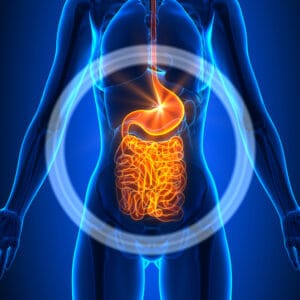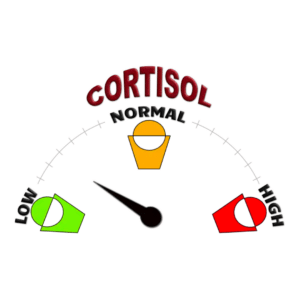SIBO is a condition in which an excessive amount of bacteria is present in the small intestine (1). This can lead to various symptoms, such as abdominal pain, bloating, gas, diarrhoea, and malnutrition. The small intestine is usually relatively free of bacteria, but in SIBO, bacteria typically found in the large intestine migrate into the small intestine and grow there.
The exact cause of SIBO is not known. In most cases, it is triggered by one of several factors, including changes in gut motility, scar tissue, food poisoning, stomach bugs, immune dysfunction and damage to the cells of the gut lining. Certain medical conditions such as diabetes, coeliac disease and Crohn’s disease can also increase the risk of SIBO.
SIBO is diagnosed by measuring the levels of hydrogen and methane in the breath after consuming a glucose or lactulose solution. High levels of either gas support SIBO. Treatment typically involves a combination of antibiotics and dietary changes (2). Antibiotics are often prescribed to reduce the bacterial population in the gut. Rifaximin, a non-absorbable antibiotic, is a common choice for treating SIBO because it is effective against gram-negative bacteria and does not disrupt normal gut bacteria. Other antibiotics, such as metronidazole and neomycin, can also be used (2).
In addition to antibiotics, dietary changes are also crucial for managing SIBO. One of the most effective nutritional strategies is a low-carbohydrate diet that limits fermentable fibres. This can help reduce the amount of food available for the bacteria to ferment, reducing the bacteria in the gut (2).
Biphasic diets are also beneficial for SIBO patients. These diets are divided into two phases: an elimination phase and a re-introduction phase. The elimination phase is intended to eliminate fermentable carbs, while the re-introduction phase is intended to help the patient find their tolerance level.
Prokinetic agents can also improve gut motility and may help prevent a recurrence. Prokinetic agents help stimulate the muscles in the gut, which can help to move food through the gut more quickly. This can help reduce the time bacteria ferment food in the gut (3).
Probiotics and herbal supplements such as Berberine and Allicin can also be helpful for SIBO patients. Berberine is a natural antibiotic that can help to reduce the number of bacteria in the gut. Allicin is an active ingredient found in garlic, which has been shown to have antimicrobial properties. In addition, herbal supplements such as peppermint oil, ginger and turmeric have been shown to have anti-inflammatory properties and may help reduce symptoms of SIBO (2).
It is important to note that SIBO can be a chronic condition, and relapses are common. That’s why it’s essential to make lifestyle and dietary changes to help prevent a recurrence. In addition, it’s important to work with a healthcare professional to develop an individualised treatment plan that considers the patient’s specific needs and goals.
Sources:
- Sorathia, S.J., Chippa, V. and Rivas, J.M. (2022). Small Intestinal Bacterial Overgrowth. [online] PubMed. Available at: https://pubmed.ncbi.nlm.nih.gov/31536241/ [Accessed 21 Nov. 2022].
- Nickles, M.A., Hasan, A., Shakhbazova, A., Wright, S., Chambers, C.J. and Sivamani, R.K. (2021). Alternative Treatment Approaches to Small Intestinal Bacterial Overgrowth: A Systematic Review. The Journal of Alternative and Complementary Medicine, 27(2), pp.108–119. doi:10.1089/acm.2020.0275.
- Quigley, E.M.M. (2017). Prokinetics in the Management of Functional Gastrointestinal Disorders. Current gastroenterology reports, [online] 19(10), p.53. doi:10.1007/s11894-017-0593-6.








